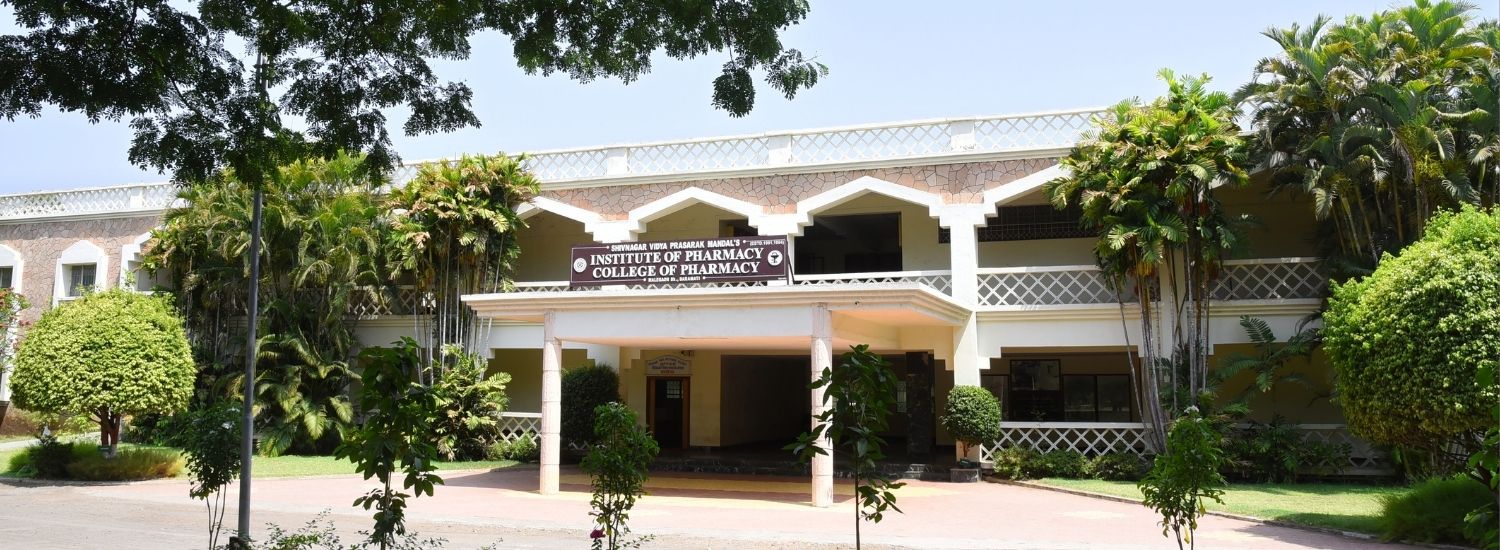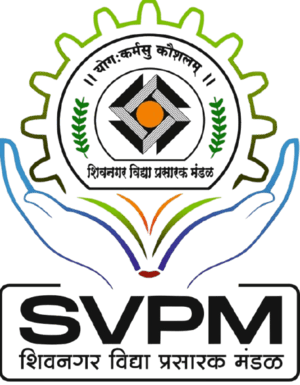- To articulate specific, achievable & measurable learning goals.
- To identify & bridge the gap in the curriculum to make learners pertinent to the current needs.
- To design & implement academic practices focused on the holistic development of learners.
- To offer ample opportunities for the classroom as well as experiential learning & formative assessments.
About College of Pharmacy, Malegaon (Bk)

Shivnagar Vidya Prasarak Mandal (SVPM) was established in 1972 with a singular goal: to empower rural communities through educational transformation. SVPM is an educational extension of The Malegaon Sahakari Sakhar Karkhana Ltd., a cooperatively run organization in Shivnagar, Tal. Baramati. Over a short span, SVPM has developed a comprehensive network of educational activities, ranging from Pre-Primary to Post-Graduate levels, including Polytechnic, Engineering, Pharmacy, Business Administration, Computational Sciences, Commerce, and more. Today, over 8000 students are pursuing education and training through SVPM.
SVPM is guided by the creative and visionary leadership of Hon. Shri. Sharadchandraji Pawar (President, SVPM), and Hon. Shri. Keshavrao Sarjerao Jagtap(Vice-President, SVPM).
The Bachelor in Pharmacy (B. Pharm) course was launched in 1994, followed by the Post-Graduate (M. Pharm) departments in 2014, with the objective of providing quality education at an affordable cost.
Vision :
To transform youth power into knowledgeable, skilled & competent pharmacy professionals.
Mission :
Core Values :
We value excellence, innovation, diversity in ideas and in community; academic integrity, freedom and transparency, we also value accountability of resources and responsiveness to changing needs and commitment to the quality education.
Long Term Goals :
- To improve students’ performance in university & other competitive examinations.
- To foster efforts to inculcate & cultivate the spirit of research.
- To evolve an environment that fosters innovation & entrepreneurship development.
- To evolve as an institute that personalizes pharmacy education.
Short Term Goals :
- To implement radical changes in goal setting, assessments & teaching-learning process.
- To ensure the availability of infrastructure & physical facilities.
- To strengthen Industry-Institute interaction for training, placements & collaborative activities.
- To opt for a ‘Learning Management Platform’ supporting the personalization of education.
- To develop an in-house ‘Teacher Training System’ to accommodate the emerging change.
- To prepare for & qualify for Academic Quality Audit (NAAC / NBA) by 2024.
Values:
We value excellence, innovation, diversity in ideas & in community, academic integrity, freedom & transparency. We also value morality, accountability of profession & accountability of resources; responsiveness to changing needs of society & commitment to quality education.
PROGRAMME EDUCATIONAL OBJECTIVES (PEO’S) :
On successful completion of undergraduate (B. Pharm) programme, the graduates shall be able do the following:
- Communicate effectively & apply the knowledge & skill of Pharmacy in the best interest of the patients and the community.
- Work independently as well as a member of a team & plan his/her work for efficient use of time and resources.
- Identify, formulate & solve the problems & think and evaluate scientifically, critically & ethically.
- Find employment in the Pharmaceutical production, Pharmaceutical Quality Control, Pharmaceutical sales & distribution, Dispensing of medicine as Hospital or Community Pharmacist, Regulatory Affairs (as Drug Inspector), Academics (as Assistant Professor), or in the Drug Information Services etc.
- Qualify competitive examinations such as GPAT, GATE, M. Pharm CET, MBA CET, MPSC (Drug Inspector), GRE, TOEFL, IELTS etc.
- Get admission for higher studies such as M. Pharm, MBA, M. Tech, M.S. etc in Indian or Foreign Universities.
- Start his/her own enterprise such as Retail or Wholesale Drug Store, Drug Information Services, Cultivation of Medicinal & Aromatic Plants, Value-addition Natural Products, Manufacturing Unit of Medicinal & Cosmetic Products, Drugs & Food Testing Laboratory etc.
- Elucidate contemporary issues & able to explain professional & ethical responsibility.
- Help and participate in the implementation of National Health Programs.
- Recognize the need for, & ability to engage in life-long learning to serve community better.
PROGRAM OUTCOMES (PO’s) :
- Pharmacy Knowledge : Possess knowledge and comprehension of the core information associated with the profession of pharmacy, including biomedical sciences; pharmaceutical sciences; behavioral, social, and administrative pharmacy sciences; and manufacturing practices.
- Thinking Abilities : Utilize the principles of scientific inquiry, thinking analytically, clearly and critically, while solving problems and making decisions during daily practice. Find, analyze, evaluate and apply information systematically and shall make defensible decisions.
- Planning Abilities : Demonstrate effective planning abilities including time management, resource management, delegation skills and organizational skills. Develop and implement plans and organize work to meet deadlines.
- Leadership skills : Understand and consider the human reaction to change, motivation issues, leadership and team building when planning changes required for fulfillment of practice, professional and societal responsibilities. Assume participatory roles as responsible citizens or leadership roles, whenever appropriate, to facilitate improvement in health and well-being.
- Professional Identity : Understand, analyze and communicate the value of their professional roles in society (e.g. health care professionals, suppliers of pharmaceuticals, promoters of health, educators, business managers, employers, employees) through consideration of historical, social, economic and political issues.
- The Pharmacist and society : Apply reasoning informed by the contextual knowledge to assess societal, health, safety, legal and cultural issues and the consequent responsibilities relevant to the professional pharmacy practice.
- Environment and sustainability : Understand the impact of the professional pharmacy solutions in societal and environmental contexts, and demonstrate the knowledge of, and need for sustainable development.
- Ethics : Honor personal values and apply ethical principles in professional and social contexts. Demonstrate behavior that recognizes cultural and personal variability in values, communication and lifestyles. Use ethical frameworks, apply ethical principles while making decisions, and take responsibility for the outcomes associated with the decisions.
- Communication : Communicate effectively with the pharmacy community and with society at large, such as, being able to comprehend and write effective reports, make effective presentations and documentation, and give and receive clear instructions.
- Modern tool usage : Learn, select, and apply appropriate methods and procedures, resources, and modern pharmacy-related computing tools with an understanding of the limitations.
- Life-long learning : Recognize the need for, and have the preparation and ability to engage in independent and life-long learning in the broadest context of technological change. Self-assess and use feedback effectively from others to identify learning needs and to satisfy these needs on an ongoing basis.
CODE OF CONDUCT :
Apart from infrastructure facilities & performance of the students, the reputation of institute is known from the conduct of students. In order to make the college feel proud of you, the following code of conduct is expected.
Students are expected to :
- Achieve Programme Educational Objectives (PEO’s) to its maximum extent.
- Attend all theory classes, practical’s, & demonstrations.
- Attend all examinations that you are entered for.
- Attend regular meetings of Guardian Teacher to discuss problems, if any.
- Be equipped for all lessons or practical’s with relevant materials.
- Be regular & punctual in studies
- Behave, dress & project your image like dignified & respectable citizens.
- Complete all your work by the agreed deadlines.
- Fully participate in tutorials, discussion, careers guidance, industrial visits, guest lecturers & any additional support arranged for you.
- Hold your student ID card with you at all times when at college.
- Keep campus clean & create congenial atmosphere & environment conducive for studies.
- Observe self imposed discipline in all activities & studies.
- Providing false information, manipulated documents, cyber crime etc clearly leads to cancellation of admission at any level.
- Regularly read the notices, so as not to miss any important information.
- Student should not discriminate on the basis of religion, caste & sex etc.
- Students are expected to conserve resources such as water, electric power, fuels etc.
- Students are expected to maintain their academic integrity. Cheating & plagiarism are violations of that standard.
- Students should keep their parents informed regularly about their performance on studies & other problems, if any.
- Students should not rag fresher rather they will make them feel comfortable. Ragging of any kind is strictly prohibited & the case will be handled according to the prevailing rules & regulations of state & central government.
- Switch off all mobile phones in learning areas & only use your mobile in an appropriate way in student common areas.
- Treat & talk to all staff, students & the local community with respect.
- Value the college environment by not dropping litter, damaging college furniture or buildings.
